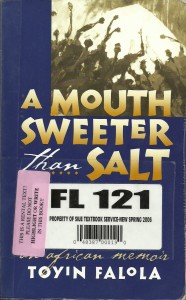 I love this review of the book A Mouth Sweeter Than Salt by Toyin Falola. It was done by Nigerian writer Ikhide Ikheloa in 2008. By the the time I was writing my mini review of that book last year on this blog, I had no idea that some other person had written something longer, deeper, more expressive of my earlier perception of the work.
I love this review of the book A Mouth Sweeter Than Salt by Toyin Falola. It was done by Nigerian writer Ikhide Ikheloa in 2008. By the the time I was writing my mini review of that book last year on this blog, I had no idea that some other person had written something longer, deeper, more expressive of my earlier perception of the work.
Like last semester, we shall be reading the book again this semester for the foreign language and culture class. It is a fascinating account of a man’s childhood in the Nigeria of the 50s, 60s and 70s. Get and read the book if you can, and take a very wild ride in the serene happy days of my country’s early nationhood.
At the end of last semester, I asked all my class students to write a two-paged review of their experience in my class. The following is an excerpt from the submission one of them.
“The one thing that I did not like about the class was the book, “A Mouth Sweeter Than Salt.” I know you did not pick it out, but it was the worst book I have read in a very long time. If you could, I would get a different novel for your class to read next semester because every chapter I read felt like pulling teeth. Well it was not quite that bad, but it was not enjoyable. Besides the book though everything else was very enjoyable. I cannot remember a class more enjoyable than this one, or a class that I laughed so much in.
Overall I could not have been more satisfied with the class. The material that I learned helped me grow as a person and made me see a part of the world how it should be looked at, and not just from a “single story.” My perception of the Yoruba and Africans in general was corrected. After going through the semester I could not have been happier in my choice to take this class. It is a great feeling knowing that I can communicate in Yoruba, even if it is at a rudimentary level. The class was more than fair in difficulty and work required. When looking back at the first day of class I realize that I never had anything to worry about and the man who walked in with the traditional attire on was a lot like me. Although I may have not changed the place where I sit in the class, almost all of my views of the African culture have been altered throughout the semester. I am thankful that I chose to take this class because it has made me a better person as a whole and have come to greater appreciate people of different cultures.”
Needless to say, he was the only one of nine people who felt sufficiently annoyed by the book to write about it in a final essay. Others passed their displeasure to me outside the class about the often winding and distracted writing style of the author. Nevertheless, it’s a great book. I recommend it.
One Comment to A Review so far. (RSS Feeds for comments in this post)